Sedentary computing lifestyles cause mental and physical harm. Among today’s office workers, symptoms like back pain, apathy, and burnout are endemic. Combining physical and mental computing strain has given birth to the term ‘technostress’. As an AI-powered Internet of Things revamps societies, technostress cases will skyrocket. So it’s comforting to know that science-based solutions to manage technostress are available. These can help office workers cope with the challenges of IoT tech in the workplace. Learn how to maintain happiness and focus while working at a desk — now, and in the impending IoT future.
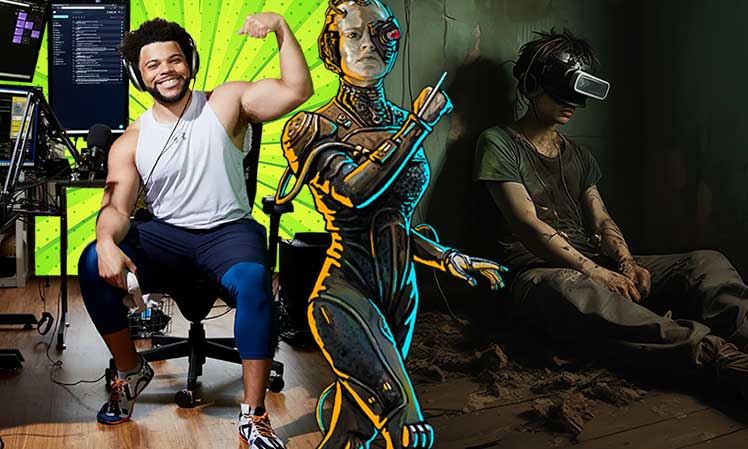
‘Technostress’ was first conceptualized in the early 1980s as an “inability to cope with new technologies in a healthy manner”(1). Three broad types of technostress were identified:
- Physical technostress: musculoskeletal stress caused by desktop or mobile computing.
- Mental technostress: brains burned out on too much digital data lose focus and willpower.
- Techno-addiction: an inability to disconnect from devices for work, play, or social reasons.
There’s also a fourth type common in times of great technological change: mental stress caused by the threat of new technologies.
Statistics: Technostress Evolves With Technology
History shows that as new technologies emerge, technostress symptoms intensify. For example, the internet went live for the masses in 1993. Soon after, collective activity levels dropped as sedentary behaviors rose.
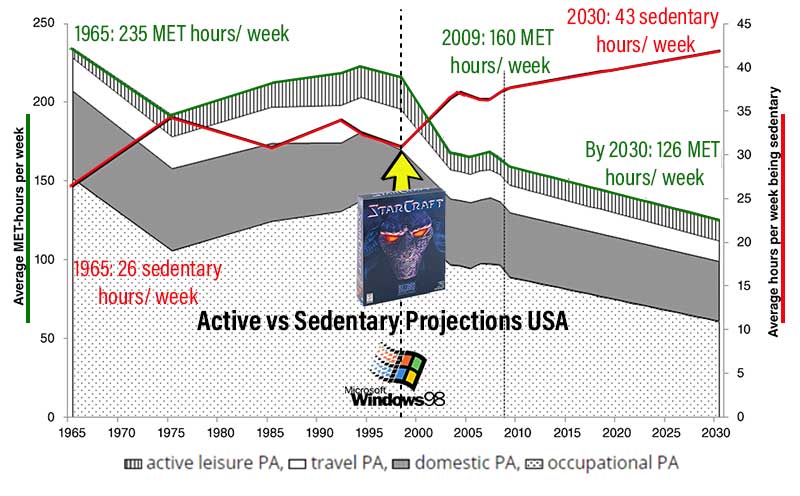
A natural byproduct of sedentary behavior is weight gain. The chart below shows that childhood obesity levels began to rise in the early 1990s. By the late 1990s, fat kid trends began showing sharp upward spikes:
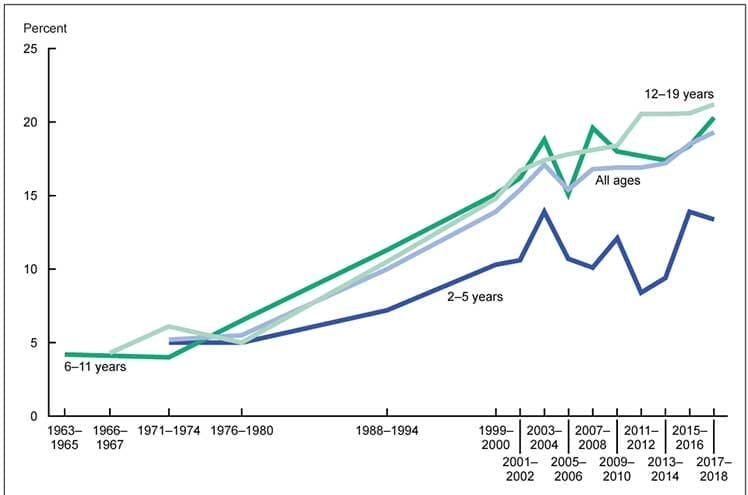
Circa 2023, desk worker health trends are grotesque. Highlights:
- Rampant obesity: 70% of UK millennials (aged 27-42 circa 2023) will be obese by the time they reach middle age.
- Lower back pain: around 49–90% of people in developed countries will develop LBP at some point; (2); U.S. millennials generate 22% more back disorder ER visits than other generations.
- Mental depression: anxiety disorders affect 40 million U.S. adults (19% of the population)(3); worker apathy (Great Resignation, quiet quitting, etc) is endemic.
- Chronic fatigue: imbalanced posture adds tension to body parts not meant to bear weight. To compensate, the body expends more energy than normal.
- Chronic migraines: forward texting postures increases stress on joints and muscles in the upper neck. The more you slouch, the worse the pain.
Technostress Problems Will Soon Explode
These days, the average person consumes around 19.5 GB of information per day. That number will soon skyrocket as the Internet of Things integrates with our lives.

Without the right support, desk workers of the future may struggle. IoT-era work will be heavily data-based. Future office workers will be under pressure to find, process, package, and share massive amounts of data.
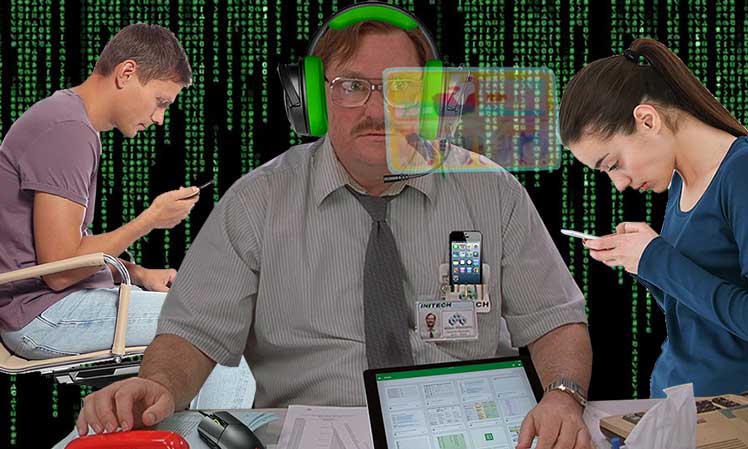
Institutional designers are already grappling with this issue. The problem: the human body and mind are not equipped for constant interaction with machines.
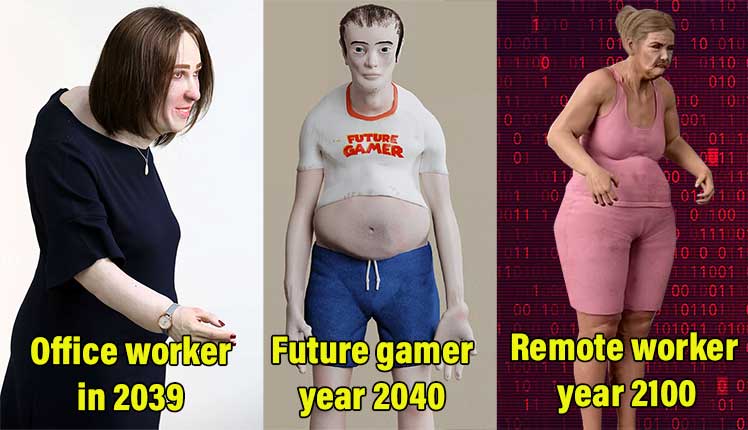
Constant inputs across multiple devices keep the brain stressed. Over time, this can cause cardiovascular, mental, and even neurological disorders(4).
Technostress From Rapid Tech Adoption
These days, technostress is considered a multidimensional sickness. Beyond problems caused by tech usage, it’s also “a negative psychological state associated with the use or the ‘threat’ of new technologies.”
Overuse of technology — and the threat of new tech — causes “anxiety, mental fatigue, skepticism, and a sense of ineffectiveness.”
- End of the Industrial age: as our product-based world falls, new information-driven smart city lifestyles will emerge.
- 4th Industrial Revolution: a WEF plan to wrap the whole world in a state of semi-virtual reality.
- Internet of Bodies: wearable tech will have intimate access to the body. This raises anxiety via privacy concerns.
- Generational shifts: by 2030, Generation Z (ages 11-26 in 2023) will make up 30% of the workplace.
- Office worker apathy: one third are ‘among the walking dead’, burned out and angry. Quiet quitting is rampant.
End Of Industrial Life, Rise Of IoT
As the IoT era comes to life, technostress problems will skyrocket. Alvin Toffler wrote about this in his 1980 book The Third Wave. It predicted the demise of the industrial age.

In its place, an information era would arise. That would lead to rapid social and economic upheaval. Those able to adapt to the changes would form a new ‘prosumer’ class.

Those unable to keep up would become unemployable, non-contributing, ‘useless’ consumers.
Learn more: Prosumers Vs Useless Consumers In The IoT Era
4th Industrial Revolution
In 2016, WEF Chair Klaus Schwab’s book The Fourth Industrial Revolution was published. It built on Toffler’s predictions by laying out plans for an Internet of Things (aka IoT).
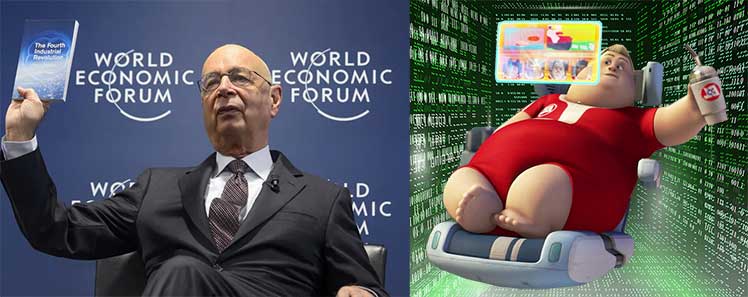
The Fourth Industrial Revolution(5) will see “billions of people connected by mobile devices, with unprecedented processing power, storage capacity, and access to knowledge…”

Add to this “breakthroughs in artificial intelligence, robotics, the Internet of Things, autonomous vehicles, 3-D printing, nanotechnology, biotechnology, materials science, energy storage, and quantum computing.”
Major Privacy Anxiety
Despite the conveniences of such tech, the potential downsides are terrifying. For example, a RAND Corporation analysis(6) notes that huge torrents of live-streaming biometric data could help to trigger medical breakthroughs.

On the flip side, there’s a risk of commodification. Then, only people with financial means may get access to IoT benefits. The bigger risk: IoT may enable a surveillance state of unprecedented intrusion and consequence.
Internet of Bodies (IoB)
Once the IoT communications grid is in place, an Internet of Bodies (IoB) is the next part of the plan:
The RAND Corporation report(6) covered IoB pros and cons. IoB products in development include microchip implants, brain stimulation devices, and internet-connected toilets.
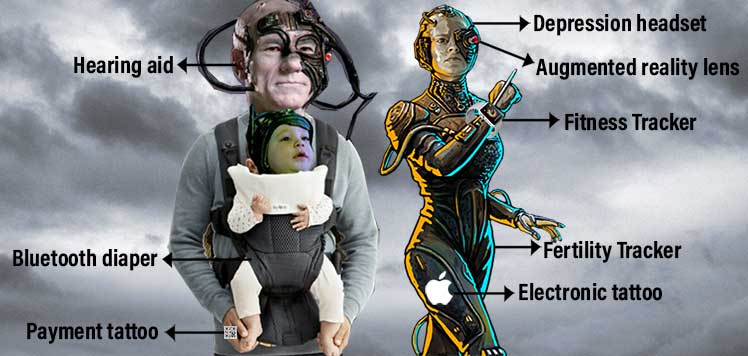
These devices will have intimate access to the body. They’ll also be able to collect vast quantities of personal biometric data. Individuals will need to manage this data while also protecting their privacy.
Bottom line: count IoB as another form of emerging technostress. That era will give people even more data to manage — while under surveillance from government authorities and product marketers.
Generational Workplace Shifts
As AI-powered technologies penetrate workplaces, a major generational shift is underway. By 2030, Generation Z will make up around 30% of the U.S. workforce.
- Generation X: born between 1965 to 1980 (ages 43-58 in 2023)
- Millennial: born between 1981 to 1996 (ages 27-42 circa 2023)
- Generation Z: born between 1997 and 2012 (ages 11-26 in 2023)
Younger digital natives enjoy a huge advantage in tech-dominated workplaces. For instance, children who play video games perform better on cognitive tasks(8) involving impulse control and working memory.

Kids who don’t play video games perform less effectively. By extension, older adults who didn’t grow up gaming may have less mental dexterity for the AI challenges of these times.
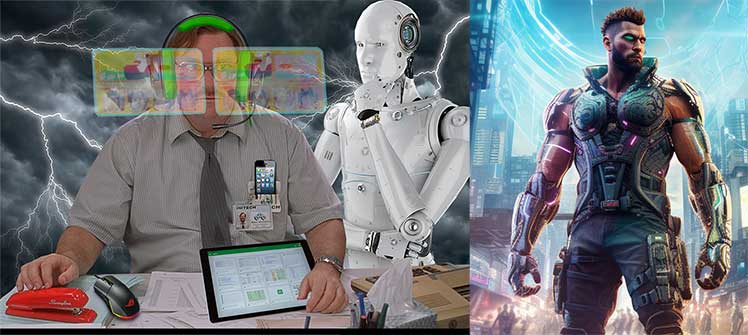
The ability of older adults to use digital tools is becoming a critical issue. Fear of technology has not been a major issue among older mobile phone users.

In sharp contrast, tech fear is a major issue among older computer users and video game players(9). Low tech adaptation is fast becoming a barrier that can reduce earning potential, independence, autonomy, and mental health.
Endemic Worker Apathy
Office technostress has been endemic for decades. Physical technostress comes from using non-ergonomic seating, under fluorescent lights, in stuffy, sterile offices. Mental technostress comes from constant notifications that interrupt your work.

Both reached a boiling point during 2020 COVID lockdowns:
- Physical: inept HR managers sent masses to work from home with only a laptop. As a result, musculoskeletal problems skyrocketed.
- Mental: to bridge distances, inept managers bombarded remote staff with emails, app notifications, and Zoom meetings to insane levels.
The mental effects of technostress include irritability, depression, apathy, and a diminished sex drive(1). This state of malaise manifested in 2021 as a Great Resignation. Then, as lockdowns ended, 3% of the U.S. workforce (47 million people) quit their jobs.
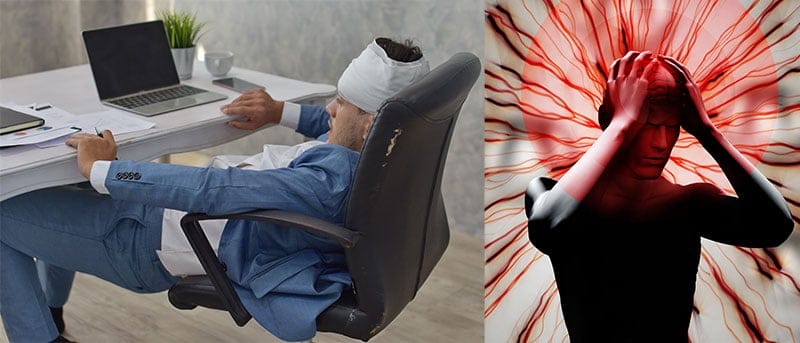
By 2022, the Great Resignation turned into a quiet quitting phenomenon. Rather than quitting, around 20% mentally checked out, doing the minimum for a paycheck.
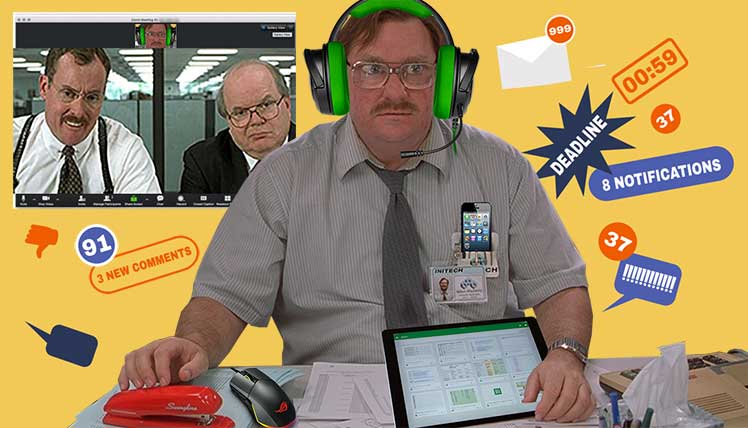
A 2021 Perceptyx study polled 15 million U.S. employees. It found one-third among the ‘working dead’.(10). They’re unhappy, unmotivated, but won’t quit because they need the cash. Key findings:
- Thirteen percent feel burned out, angry, and ready to quit.
- Only 18% feel personal accomplishment at work. However, 70% imagine being in the same job 12 months later.
- Only 25% are willing to put in more than the minimum effort.
Technostress From Using Technology
The Handbook of Human Factors and Ergonomics (HFE) has been documenting institutional workplace design standards since 1994. Its first four editions prioritized ergonomic back support for desktop computer users.
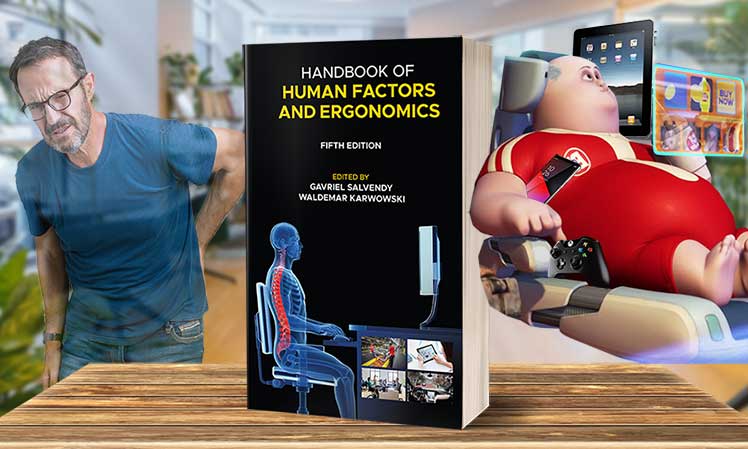
The 5th edition HFE was released in late 2021. It reframes seated back support as a foundational concern. In its place, technostress emerges as the great ergonomic challenge of our time.
Full-time users of computing technology suffer from three broad types of technostress:
- Techno-addiction: hooked on dopamine rushes, can’t disconnect, always checking one’s phone.
- Physical technostress: musculoskeletal harm caused by long periods of sitting / lack of movement.
- Mental technostress: brains burned out on digital info struggle with focus and discipline.
Techo-Addiction: Can’t Disconnect
One of the big drivers of techno-addiction is social media. A study of 444 Facebook users found that the platform causes stress, but users don’t log off when that happens. Instead, they switch between chatting, scanning feeds or posting updates.

As a result, the medium that causes stress is being used to relieve the stress it causes! This builds compulsive behavior for excessive tech use(11).
The symptoms of techno-addictions should be obvious to everyone. They include:
- Constant smartphone use — even during social gatherings.
- Wake often through the night to check notifications.
- Consume most movies and TV on their phone (not a TV).
- Makes loud calls in shared quiet spaces (movie theaters, restaurants, etc).
Social media serves as a gateway for other tech obsessions. Workaholism can develop as the user becomes unable to disconnect from work-related ICTs (phone, computer, etc.).

Common work-related techno-addiction symptoms:
- Compulsively perform work-related functions outside of normal business hours.
- Feels anxiety when disconnected from a device and unlimited information.
- In constant anticipation of receiving notifications.
- Strong negative reactions to interrupted ICT use.
Physical: Sitting Pain & Fatigue
Sitting without ergonomic support flattens the lower back curve. That misaligns the spine’s natural curvature. To compensate, back muscles must work harder at holding the torso upright.
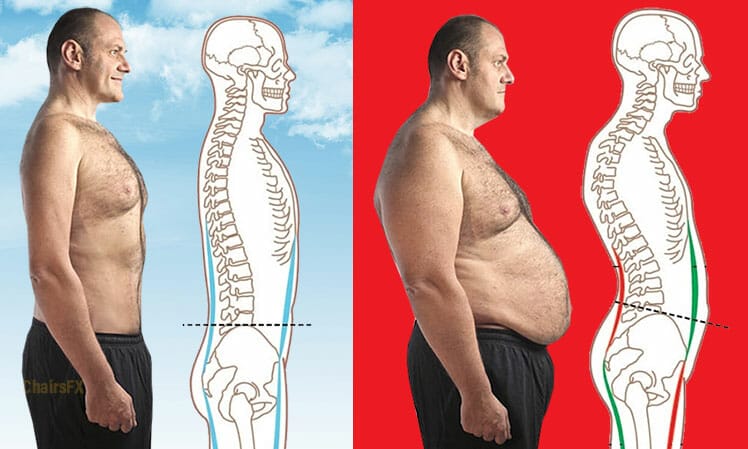
As a result, the brain gets less energy to function. Over time, sloppy sitting also causes various musculoskeletal disorders. These include:
- Chronic fatigue: a misaligned spine drains energy by forcing muscles to work harder.
- Migraines: forward head posture stresses neck muscles until pain explodes in the brain.
- Wrist disorders: 4 million Americans suffer from carpal tunnel syndrome.
- Neck pain: the fourth-leading cause of disability in America.
- Shoulder pain: causes around 4.5 million USA doctor visits per year and $3 billion in health costs.
The solution to these problems for desktop computer users: invest in an ergonomic chair.
Common Desk Worker Musculoskeletal Disorders
Text Neck Syndrome
Extended use of laptops, and devices increases the risk of upper back musculoskeletal disorders. This issue is commonly referred to as Text Neck Syndrome.
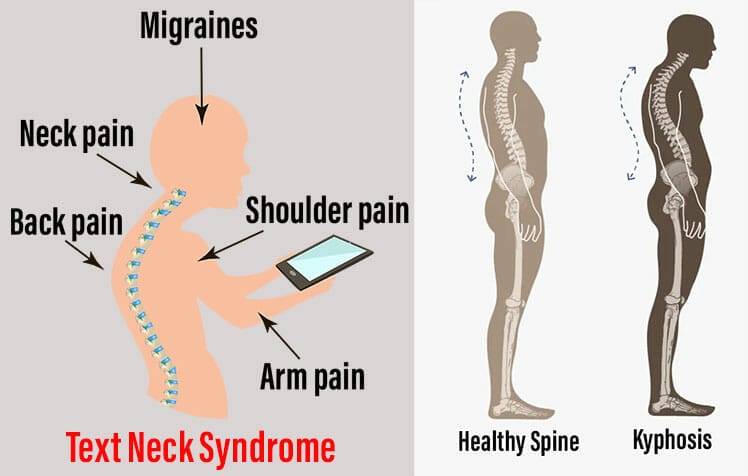
When using cell phones, many people tilt their necks forward by 45° or more. This position strains the neck, shoulders, and the entire spine.
Sitting without back support when texting showed the highest head and neck flexion(8). Text neck syndrome usually starts as neck and shoulder stiffness.
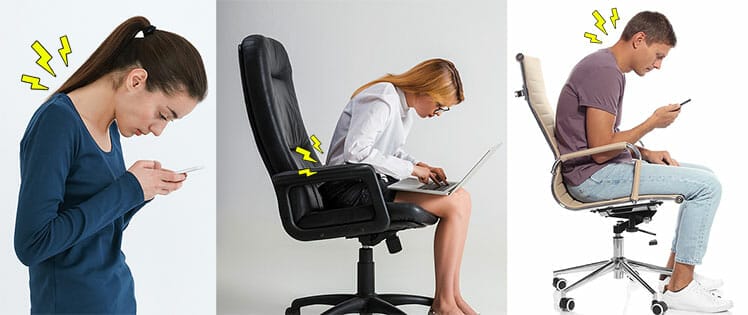
Frequent migrants is another common text neck symptom. If not addressed, these can manifest as more serious problems. These include:
- Thoracic kyphosis: excessive forward curvature of the upper back. This tightens hamstrings and stiffens the upper back.
- Spinal disc degeneration: slumped postures wear down spinal discs. At first, this limits movement. Once degenerated discs leak fluid, swelling and pain emerge.
- Chronic fatigue: misaligned muscles burn more energy than normal to hold the body up against gravity.
Mental Technostress: Brain Burnout
The brain is powered by glucose. Strenuous activities (like video games) burn more glucose than simpler ones (like casual reading). As glucose reserves fall, executive functions weaken.

Executive functioning is a mental process located in the prefrontal cortex. This is where the brain executes plans, focuses attention, and exerts willpower.
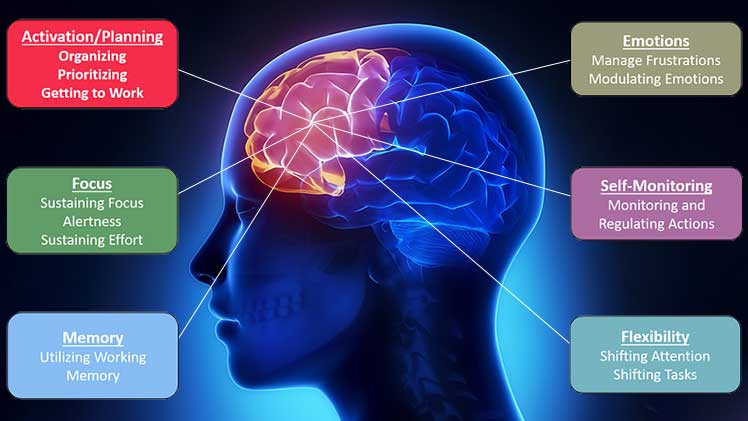
When you knuckle down to keep focus on a task, executive functions provide the willpower. In a similar fashion, eating healthy food instead of junk is driven by executive function processes.

As the brain gets tired, focus and discipline both crumble. This is why stressed office workers cope with binge drinking, overeating, and escapism.
Executive Function Digital Burnout Statistics
Sedentary And Obesity Epidemic
Physical technostress MSDs limit mobility. Mental technostress exhausts executive functions (which power self-control, planning, focus, and working memory). Sedentary behavior + no self-control = an obesity epidemic.

In America, childhood obesity levels began to surge soon after the Internet went live for the masses (1994). Circa 2023, around 30% of American adults are obese.

As deskwork becomes technical and complex, this poses a problem. As a person gets fatter, their cognitive functioning slows in many ways. Examples:
- Obesity is linked with reduced cognitive functioning, short-term memory loss and learning difficulties.
- Obese people have less cognitive flexibility (the ability to adjust plans).
Behavioral patterns also suggest obesity is a poor fit for the IoT era. Studies have found that obese people often lack initiative, inhibition, and self-monitoring skills. These traits get expressed as apathy, impulsivity, and poor behavioral control.

Bottom line: physical fitness is emerging as a necessity for professional desk workers in a purely information-driven era. Learn more:
Technostress Solutions
Technostress solutions are already getting worked out on two fronts. The first has a long history of failing to address human factors. The second looks like a blueprint that could solve technostress for many.
Ineffective Institutional Solutions
The institutions and think tanks that shape our societies have historically done sloppy work catering to human factors. For instance, when schooling became mandatory for American kids in the 1800s, back problems skyrocketed.

Despite this, school seating hasn’t evolved in over 150 years. To this day, institutional designers continue to ignore the physical and mental problems caused by non-adjustable student seating.
Ergonomic Illiteracy in U.S. Classrooms
Corporate Technostress Tactics
Healthy sitting standards for office workers were first documented in the 1980s. Even so, millions of office workers worldwide still toil in back-breaking basic office chairs.
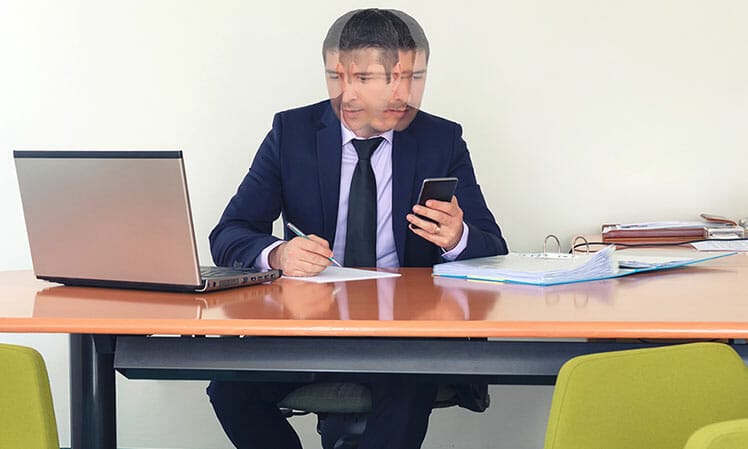
These days, the typical office worker sits all day long wearing formal clothes on a cheap chair. They must find, process, and share information across multiple devices under harsh fluorescent lights.
This is because corporate responses to technostress issues are usually clumsy. Most major ‘studies’ had no theoretical framework or preventive aims. As a result, measuring effects has been purely anecdotal(1).
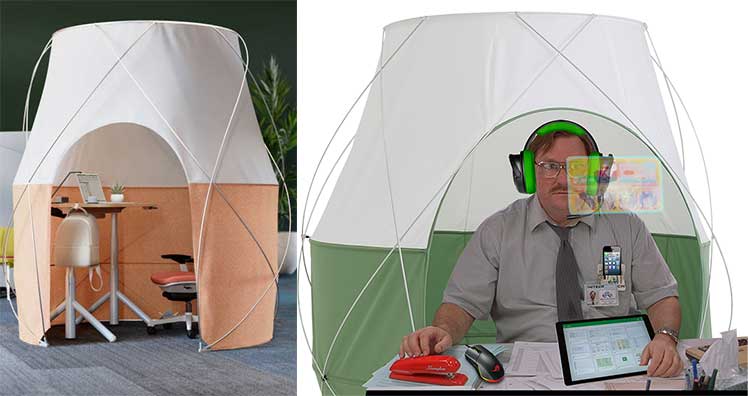
For example, Steelcase is the largest office furniture company in the world. One of the latest Steelcase technostress solutions is a tent. There’s no theoretical justification or means to measure effectiveness: “Tents inherently make you feel comfortable and safe when you’re inside of them.”
4 Pillars of Computing Performance
Top esports and chess pros have mastered strategies to ensure optimal computing performance. As they compete, millions get exposed to their methods. This gives desk workers an easy blueprint to follow.

The formula is most commonly broken down into four pillars of performance. These are:
- Nutrition: eating low-carb, non-processed food to maintain stable blood sugar levels.
- Recovery: give the brain time to rest and recharge.
- Physical fitness: build a strong core to mitigate harm caused by sitting.
- Psychological fitness: maintain mental balance to avoid burnout.
Team Liquid Performance Pillars
The four pillars are deployed in some form by many of the world’s top esports teams. For instance, Team Liquid supports psychological health by giving their players structure.
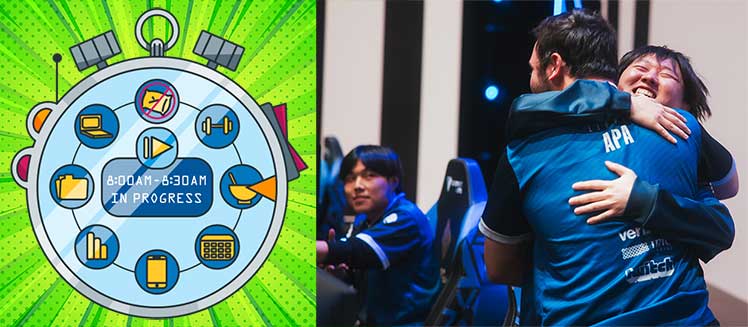
Here’s some of the structure that Team Liquid advises to manage the mental health of esports athletes:
- Mental balance: achieving a good balance of mental arousal vs cognitive anxiety.
- Ease physical anxiety: people tense up when stressed; massage helps loosen them.
- Cardio conditioning: helps a body maintain a high heart rate for longer periods.
- Set routines: use pre-game and in-game routines to control physical anxiety.
- Envision adversity: visualize things going wrong — but you still succeed.
Magnus Carlsen Performance Pillars
In the 1980s, chess players used to play hard and party harder. Sloppy eating, drinking, and sleeping habits were typical. But once computing entered the chess world, skill levels soared worldwide.

To keep up, pro chess players were forced to evolve. These days, many (like world #1 Magnus Carlsen) also uses variations of the four performance pillars.
For instance, to help him sit comfortably for long periods, he now uses a Secretlab Titan gaming chair while he plays. But the chair is just a tool. To ensure proper usage, he also does exercises to build stronger core muscles.
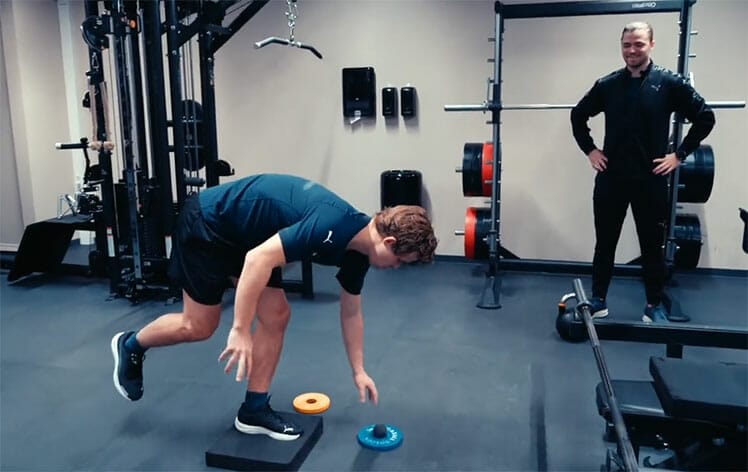
With a strong core and a good chair, he’s able to sit comfortably for long periods — without unnecessarily taxing his body and mind.
Ergonomic Chair Wellness Kickstart
The ‘four pillars’ concept was coined by esports performance coach Taylor Johnson. He sees esports performance coaching as a way to take health & wellness mainstream:
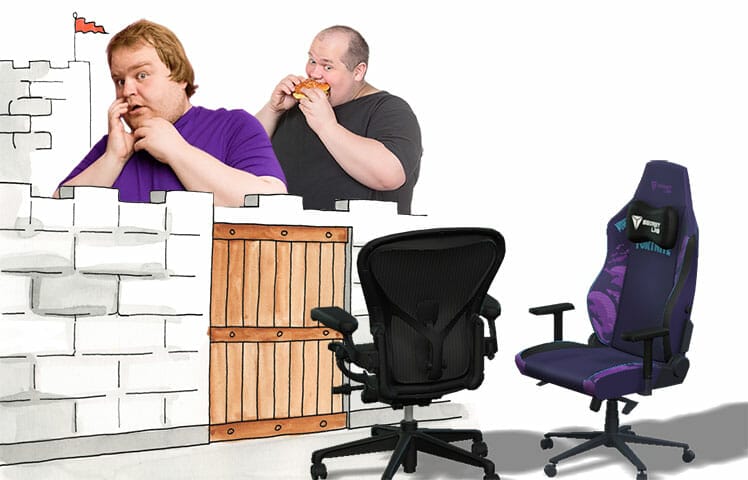
In the big picture, it doesn’t matter whether you choose a gaming chair or an ergonomic office chair. What does matter is that you use your chair correctly by aiming to sit in healthy neutral postures.

Beyond neutral sitting, adhering to the four pillars is all you’ll need to perform like a pro. Learn more:
Technostress Relief Recap
As the world shifts into a full-blown IoT society, widespread turbulence is expected. Full-time computer users can expect to struggle with three types of intensifying technostress in that future:
- Techno-addiction: hooked on dopamine rushes, can’t disconnect, always checking one’s phone.
- Physical technostress: musculoskeletal harm caused by long periods of sitting / lack of movement.
- Mental technostress: brains burned out on digital info struggle with focus and discipline.
Everyone will also have to deal with terrifying anxiety caused by rapid socio-technological evolution.
Ergonomic Furniture As Wellness Gateway
Superstars like Team Liquid and Magnus Carlsen pay coaches to help them adopt the 4 computing performance pillars. But even lowly office workers can adopt these with an easy entry point: ergonomic seating.
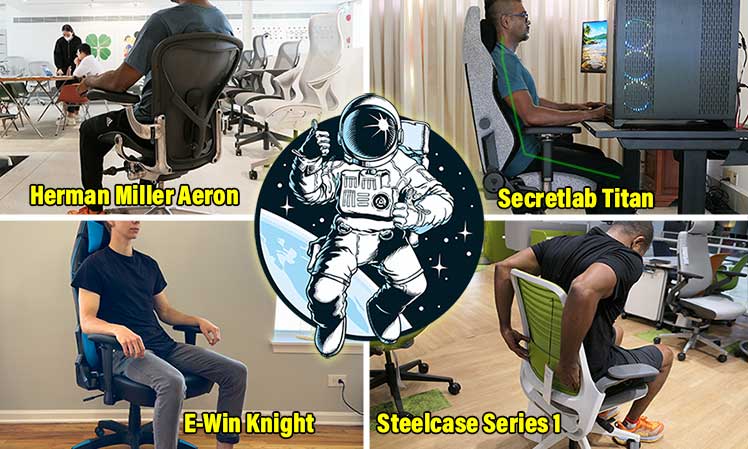
Whichever type of ergonomic chair you choose, use it to develop a neutral sitting posture habit. After you manage that comes a big surprise: a massive surge of excess energy.

With an aligned, supported spine, your back muscles can rest. That leaves a massive amount of energy for other uses.
My DIY Gaming Chair Wellness Ascension
Sitting in neutral postures relieves back muscles and energizes the brain. At first, you’ll notice the effect as longer periods of pain-free sitting with super-sharp focus. Over time, you’ll also gain greater body awareness.

Another benefit of having excess energy: a growing desire to burn some of it off. In my case, I parlayed the energy-boosting effects of my first gaming chair to lose my beer belly!
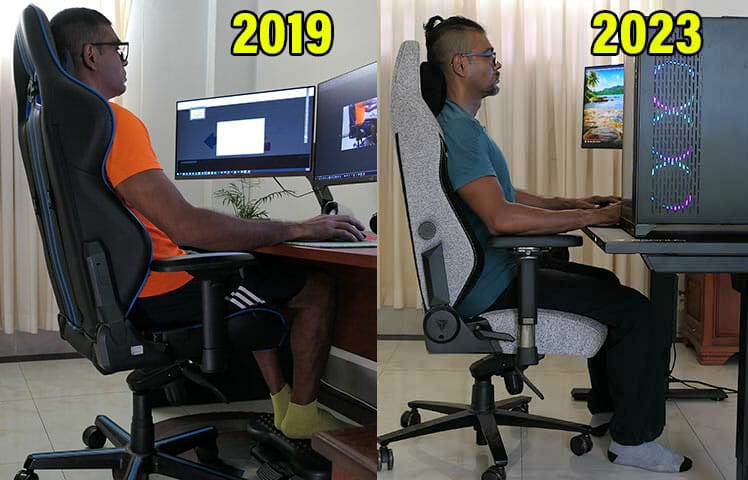
Over time, my DIY 4 performance pillar plan has steadily evolved. I’ve refined my sitting techniques, workout methods, diet, and mental wellness strategies.
DIY 4 Pillar Roadmap For Everyone
Circa 2023, I’m managing technostress by maintaining neutral postures in a Secretlab Titan chair. This type of ‘comfort’ isn’t as delicious as a fluffy sofa. Rather, it’s a subline absence of discomfort that feels like floating.
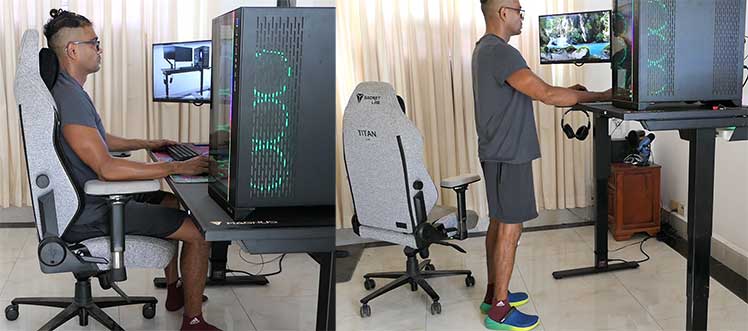
To boost movement and support mobile computing, I use my chair with a Secretlab Magnus Pro sit-to-stand desk. Combined, this kit supports desktop and mobile computing with plenty of movement. I love it!
Build Your Own IoT Workstation
A good ergonomic setup gives everyone the means to embark on their own performance improvement journey. Choose whichever style (gaming or office) that you fancy.
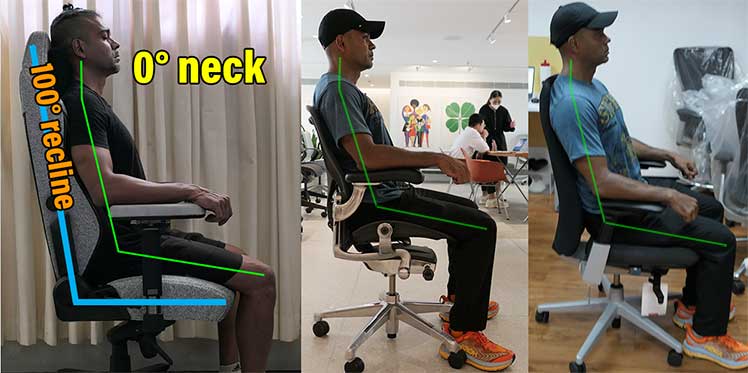
If you can afford it, high-end models like the $1500+ Herman Miller Aeron come guaranteed for 12 years with several layers of extra luxury. But if money’s tight, many cheap ergonomic chairs can do the job that you need!
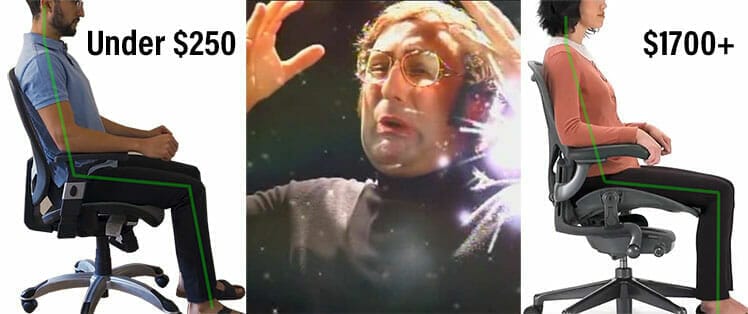
After making your pick, focus on sitting with neutral postures as a habit. Once your body adjusts, expect a massive energy boost. Use that surge to develop your own 4 computing performance pillars plan:
- Nutrition: eating low-carb, non-processed food to maintain stable blood sugar levels.
- Recovery: give the brain time to rest and recharge.
- Physical fitness: build a strong core to mitigate harm caused by sitting.
- Psychological fitness: maintain mental balance to avoid burnout.
Bottom line: every holistic technostress prevention plan starts with a good ergonomic chair. Using one properly is the key to success. Doing so will give you the energy you need to prosper — now, and in the future. To master proper usage in days, read this:
How To Sit: Gaming / Ergonomic Office Chair Neutral Posture
Footnotes
- Eleonora Brivio, et al. ‘Preventing Technostress Through Positive Technology’, Front. Psychol., 17 December 2018. https://doi.org/10.3389/fpsyg.2018.02569, (accessed 28 July, 2023).
- Lixia Ge, et al. ‘Chronic low back pain and its impact on physical function, mental health, and health-related quality of life’. Sci Rep 12, 20040, November 21, 2022. DOI: doi.org/10.1038/s41598-022-24703-7, (accessed 28 July, 2023).
- ADAA. ‘Anxiety Disorders – Facts & Statistics’. Updated October 28, 2022. https://adaa.org/understanding-anxiety/facts-statistics, (accessed 28 July, 2023).
- Marta Chiappetta. ‘The Technostress: definition, symptoms and risk prevention’. Sapienza University of Rome, April 2017. DOI: 10.14616/sands-2017-1-358361, (accessed 28 March. 2022).
- Klaus Schwab. ‘The Fourth Industrial Revolution: what it means, how to respond’. World Economic Forum, Jan. 14, 2016. https://www.weforum.org/agenda/2016/01/the-fourth-industrial-revolution-what-it-means-and-how-to-respond/, (accessed 28 March. 2022).
- Lee, et al. ‘The Internet of Bodies: Opportunities, Risks, and Governance’. RAND Corporation, RR-3226-RC, July 15, 2023. https://www.rand.org/pubs/research_reports/RR3226.html, (accessed 31 July 2023).
- Frederic Lemaitre. ‘China’s smart cities have gone from utopia to dystopia’. June 8, 2022. https://www.lemonde.fr/en/opinion/article/2022/06/08/china-s-smart-cities-have-gone-from-utopia-to-dystopia_5986129_23.html, (accessed 31 July 2023).
- NIH News. ‘Video gaming may be associated with better cognitive performance in children’. October 24, 2022. https://www.nih.gov/news-events/news-releases/video-gaming-may-be-associated-better-cognitive-performance-children, (accessed 31 July 2023).
- Dina Di Giacomo, et al. ‘Psychological Barriers to Digital Living in Older Adults: Computer Anxiety as Predictive Mechanism for Technophobia’. September 9, 2019. https://www.ncbi.nlm.nih.gov/pmc/articles/PMC6770433/, (accessed 31 July 2023).
- Perceptyx. “One Third of All Employees Are ‘Working Dead’ — Unhappy, Unmotivated, and Staying Put”. Oct. 28 2021. https://blog.perceptyx.com/news-research-one-third-of-employees-are-working-dead-report, (accessed 4 April 2022).
- Reviewed by Kate Anderton. ‘Technostress linked to addiction for social media platforms’, August 27 2019. https://www.news-medical.net/news/20190827/Technostress-linked-to-addiction-for-social-media-platforms.aspx, (accessed 4 April 2022).




